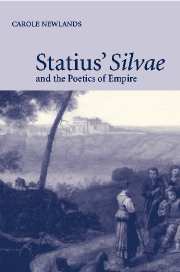Book contents
- Frontmatter
- Contents
- Acknowledgments
- 1 Introduction
- 2 Embodying the statue: Silvae 1.1 and 4.6
- 3 Engendering the house: Silvae 1.2 and 3.4
- 4 Imperial pastoral: Vopiscus' villa in Silvae 1.3
- 5 Dominating nature: Pollius' villa in Silvae 2.2
- 6 Reading the Thebaid: Silvae 1.5
- 7 The emperor's Saturnalia: Silvae 1.6
- 8 Dining with the emperor: Silvae 4.2
- 9 Building the imperial highway: Silvae 4.3
- References
- Index locorum
- Index of subjects and proper names
5 - Dominating nature: Pollius' villa in Silvae 2.2
Published online by Cambridge University Press: 22 September 2009
- Frontmatter
- Contents
- Acknowledgments
- 1 Introduction
- 2 Embodying the statue: Silvae 1.1 and 4.6
- 3 Engendering the house: Silvae 1.2 and 3.4
- 4 Imperial pastoral: Vopiscus' villa in Silvae 1.3
- 5 Dominating nature: Pollius' villa in Silvae 2.2
- 6 Reading the Thebaid: Silvae 1.5
- 7 The emperor's Saturnalia: Silvae 1.6
- 8 Dining with the emperor: Silvae 4.2
- 9 Building the imperial highway: Silvae 4.3
- References
- Index locorum
- Index of subjects and proper names
Summary
animus hominis dives, non arca
Cicero, Paradoxa Stoicorum 44With Silv. 2. 2, Statius takes the reader far from Rome to the Bay of Naples and the luxurious villa of Pollius Felix and his wife Polla. This is Statius' first poem set in his own homeland of Campania. Whereas the impetus for the description of the villa in Silv. 1. 3 is not revealed, the occasion for Statius' visit to the villa is here made known. In the poem's opening lines, Statius explains that after competing at the Augustalia, the great Neapolitan quinquennial festival established by Augustus, he gladly accepted the invitation to relax for a while on his native soil with his friends before making his way to Rome (6–12). The poem therefore is set between two significant poles in Statius' career, Naples and Rome, the region of his birth and the centre of Empire. The luxurious villa thus acts here as the particular focus for a set of tensions between Greek and Roman culture, between regional and national identity, and between the safety of home and the dangerous adventures of Empire.
Pollius Felix is the friend to whom, along with his wife Polla, Book 3 is dedicated (Polli dulcissime, praef. 3. 1); his Campanian estate forms the subject of two poems, Silv. 3. 1 as well as Silv. 2. 2. Pollius Felix was not a Roman aristocrat; he belonged to Campanian, not Roman society.
- Type
- Chapter
- Information
- Statius' Silvae and the Poetics of Empire , pp. 154 - 198Publisher: Cambridge University PressPrint publication year: 2002

